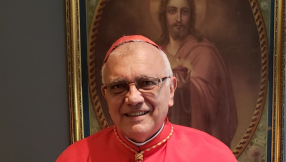Yesterday marked the 499th anniversary of Martin Luther's nailing of his 95 Theses on the door of the Wittenberg church. They were an attack on the moral corruption and theological errors of the Catholic Church to which he belonged, and they touched off the Protestant Reformation. The anniversary marked the beginning of a year of celebrations and commemorations, leading up to the Reformation 500 events next year. It also saw Pope Francis sign a document with the President of the Lutheran World Federation in Lund, Sweden, at the end of a once-unthinkable joint prayer service. It expressed regret for past conflicts and determination to seek unity.
Well, that's good news, isn't it? Nice to know all their problems are over, even if it has taken 500 years.
That is a little premature. Well, more than a little. The document is significant in that both sides say warm things about the other and admit they've made mistakes ("Lutherans and Catholics have wounded the visible unity of the Church. Theological differences were accompanied by prejudice and conflicts, and religion was instrumentalised for political ends.") There's a lot of talk about moving on to "full unity", but this is a long way away still.
But I thought the Pope was a bit of a fan of Luther?
That's putting it much too strongly, though he did praise Luther for having restored the centrality of Scripture to the Church, and admitted he made some good points: "There was corruption in the church, worldliness, attachment to money and power." However, Francis' willingness to see the good even in Luther has gone down like the proverbial lead balloon with conservative Catholics, for whom he was the devil's disciple and the man who introduced waves of heresy into the Church.
Ah. It's easy to forget Francis is not universally loved.
Indeed; in parts of the Catholic blogosphere he is regarded as a traitor.
So what are the remaining obstacles to unity, and what would unity look like?
How long have you got? Luther's central idea was around "justification", how a person could be made right with God. He was an acute scholar, and reading Romans convinced him it was by faith alone – the standard evangelical and Protestant position today. Catholic theology had developed to emphasise the need for good works, confession and penance. So it was an important question: how do you become a Christian? But in 1999 the Roman Catholic Church and the Lutheran World Federation agreed a Joint Declaration on the Doctrine of Justification in which they said they basically believed the same thing and withdrew their fearsome condemnations of each other.
So no problem there, then?
It was a considerable ecumenical advance, certainly, and shows what can be done if people talk to each other rather than lobbing theological hand grenades into each others' trenches. However, it has to be said that talk of the Reformation being "over" is premature. Evangelical theologians issued a "statement of evangelical convictions" last week saying that the fundamental differences between Catholics and Protestants are still there. In spite of the Joint Declaration, it says, Catholics don't really believe in salvation through faith alone. It also says Catholics do not accept the supreme authority of the Bible, believe in Mary's immaculate conception and bodily assumption into heaven, and in Papal infallibility. Another commentator, Union School of Theology's Michael Reeves, thinks there are still two radically different views of justification that haven't really come closer together.
In other words, Catholics are still Catholics?
Quite, and Lutherans are still Lutherans. One of the difficulties for Protestants in the Independent tradition, which many evangelicals are, is that Luther wasn't one of them (he believed in the Real Presence of Christ in the Eucharist, for example) and the Lutheran Church is certainly way outside that tradition. So in spite of the debt evangelical Protestants owe to Luther, actual Lutherans find it easier to talk to Roman Catholics and find common ground than they do.
But if Catholics and Lutherans agree on justification, which was the point of the whole Reformation, at least they ought to be able to kiss and make up?
The trouble is that all that happened 500 years ago, and Lutherans have taken radically different paths since then. They have women priests, which Catholics won't hear of, and they are relaxed about same-sex relationships, which is even worse. And there's always the problem of authority – is the Pope in charge, or not? And they have a different understanding of priesthood and the Eucharist, some of them tolerate startlingly liberal teaching, and there's a question about the status of the Lutheran World Federation – it's a federation, rather than a Church, so has a limited ecclesiastical status.
Ah. So there is some way still to go.
I wouldn't bet on anything under 500 years.
Follow Mark Woods on Twitter: @RevMarkWoods













